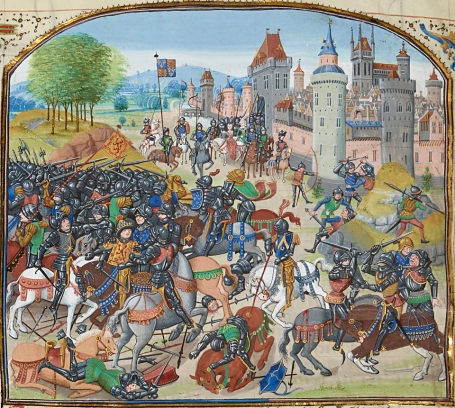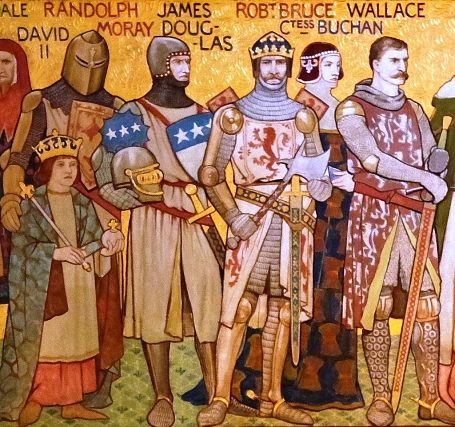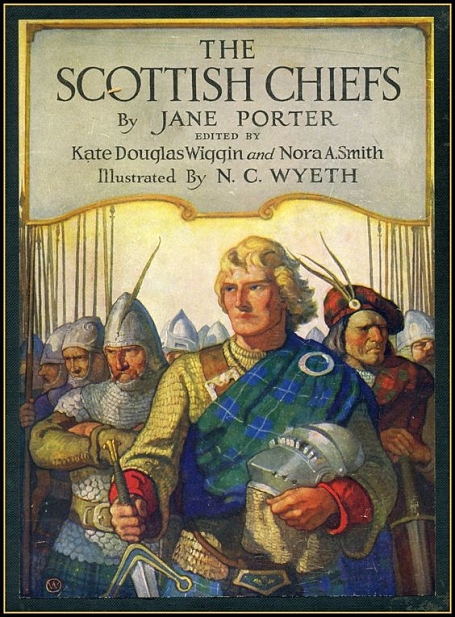The Life and Heroick Actions of the Renoun'd Sir William Wallace,
General and Governour of Scotland
by William Hamilton of Gilbertfield
Book XII, Chapter VI (Continued)
How WALLACE was betray'd by Sir John Monteith, carry'd to England and martyr'd there.
Then was he carry'd South o'er Solway Sands
And left in Vallange and Lord Clifford's Hands.
To Carlile Prison with him they do scour,
Which to this Day is called Wallace Tow'r.
Some Writers please to say, but that's not sound,
That Wallace martyr'd was in Berwick Town;
That could not be I'm very sure, for then,
It was possest by brave bold Scottish Men.
For which the Traitors went not by the Merse,
Nor durst they march thro' Berwick for their Arse.
Scotland, alas! to whom wilt thou Complain!
From Tears, alas! how canst thou now refrain!
Since thy best Help is falsly brought to Ground,
And Chieftain bold in cruel Fetters bound.
O! who will thee defend in thy true Right,
Or like brave Wallace ever shine so bright.
Thy Grief and Anguish now approacheth fast,
Thou shalt in Sorrow soon be left at last;
Thy General, and noble Governour,
Is too, too nigh his last and fatal Hour.
Who shall defend thee now and make thee free?
Alas! in War who shall thy Leader be?
Who shall rescue thee now from Saxon Rage,
And who their Wrath and Fury can asswage?
I say no more, but beg GOD of his Grace,
May thee in hast restore to wealth and Peace.
Brave Wallace now shall thee govern no more
Who to thy Rights restor'd thee Thrice before.
'Mongst Wallace Men, at Glasgow where they lay,
Great Sorrow was, when they found him away.
Unto Lochmabane, Longoveil did pass,
In mighty haste, where good Prince Edward was.
Where he in greatest Grief, and Sorrow swore,
He never would depart from Scotland more,
Nor yet his Native Land of France would see,
On Wallace Foes, till he aveng'd should be.
Thus did that Knight in Scotland still remain,
Untill the Bruce returned Home again;
Was with the King when he St. Johnstoun took,
The Second Man that enter'd, says the Book.
With Chartris Lands was gifted by the King,
From whom the Chartris ever since do spring.
Robert the Bruce came Home on the Third Day,
To Scotland after Wallace was away.
And at Lochmabane with good Edward met,
Where he the News of Wallace soon did get.
At which was so exceeding griev'd and sad,
He almost lost his Wits, was next to mad.
"Hold, Brother," Edward said, "by all that's good,
If we him lose, we shall revenge his Blood.
It's for your Cause he's now to England led,
In your Defence Scotland he Thrice hath free'd.
And had he not a faithfull Subject been,
The ancient Kingdom we had never seen.
Remember when he offer'd was the Crown,
How he refus'd, and knock't the Project down.
And now the Traitor that him basely sold,
From you he thinks Dunbartan for to hold."
Unto Dalsuintoun Edward order'd was,
With Men in Arms next Day in haste to pass.
And if he chanc'd to find the Cummine there,
That by no Means his Life he then should spare.
Finding him not, they all return in Peace,
The King thereafter kill'd him in Drumfries.
How that was done is needless to be shown,
Since perfectly to every Man it's known.
First to the King came Douglas that brave Knight,
In all his Wars who worthy was and wight,
Nor need I tell how Bruce did take the Crown,
And how Lord Soulis deliver'd Berwick Town,
Galloway lost, How John of Lorn arose
Against the King with many other Foes.
How Brechin bold, against the King did ride,
With whom few honest Scotsmen did abide.
And how the North was given from the King,
Which made him long in painfull War to reign.
But Douglas still his Loyalty did shew,
And to the King was steadfast, firm, and true.
A better Chieftain Bruce had never one,
Save Wallace who's without Commparison.
Yet of the Douglas, more good Knights have been,
Than in one House, was e'er in Scotland seen.
As Bruce's Book doth plainly testify,
By Mr. Barbour written faithfully.
With Clifford now, Wallace to London goes,
A Prisoner amongst his Mortal Foes.
Then in a Prison strong clap't up was he,
Whose dismal Hour King Edward long'd to see.
The ballad, The Life and Heroick Actions of the Renoun'd Sir William Wallace, General and Governour of Scotland, by William Hamilton of Gilbertfield, 1722, is in the public domain.

The Kingdom of England and the Kingdom of Scotland fought dozens of battles with each other. They fought typically over land, particularly Berwick-Upon-Tweed, and the Anglo-Scottish border frequently changed as a result. Read more at Wikipedia.

The First War of Scottish Independence was the initial chapter of engagements in a series of warring periods between English and Scottish forces lasting from the invasion by England in 1296 ... Read more at Wikipedia.

Digitized version of The Scottish Chiefs, by Jane Porter, a novelization published in 1921 by Charles Scribner's Sons, about William Wallace and the First Scottish War of Independence. Read online at archive.org.